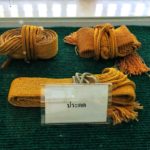
Sakon Nakhon in March

In some parts of the world it is said that March “comes in like a lion and goes out like a lamb”. In Sakon Nakhon, we might say the same thing, except that the lion isn’t stormy, winter weather but the loud cacophony of millions of cicada males wooing females with their mating call. The chorus usually ends around the end of the month, leaving only the sweet sounds of birds in the countryside.
While you’ll hear the annual cicadas (Cryptotympana Atrata) calling loudly from trees as you travel around Sakon Nakhon, it is likely that you won’t see any, unless you climb up a tree for close inspection, as the cicadas blend in closely with the bark of trees to avoid predators. One would think that some local delicacies might be made from the cicadas, considering how much residents enjoy eating other insects, such as crickets and red ants. However, we have yet to see cicadas being sold at any markets, perhaps because raw cicadas are known to make people sick, thus the locals don’t wish to risk eating them, even after they are cooked.
The Sakon Nakhon weather in March is often quite hot, as it is the beginning of the hot season in Thailand. However, brief cool spells can still occur (thankfully) and even though the hot season is also a dry season, rain storms during the day can occasionally happen. Indeed this year (2022), we had several days with torrential rains for a few hours, which is a blessing to both farmers and the landscape at large, which always transforms back to a lovely green color after the rains.
Sakon Nakhon in March is also when mosquitoes tend to return (having dropped in number during the cool season). You can pick up some eco-friendly herbal mosquito repellent in shops that is quite good at fending off mosquitoes for most people. While there are occasional cases of Dengue Fever in the city (a disease carried by the Aedes aegypti mosquito), the risk to tourists is quite low. And you can reduce the low risk even further by making sure you wear some repellent at dusk, which is when the Aedes aegypti female mosquitos fly about looking for someone to dine on.
- The Royal Ploughing Ceremony in Thailand – A History - May 8, 2024
- Dying Well the Buddhist Way in Thailand - May 7, 2024
- Comforting Words for the Brokenhearted in Thailand - May 6, 2024




